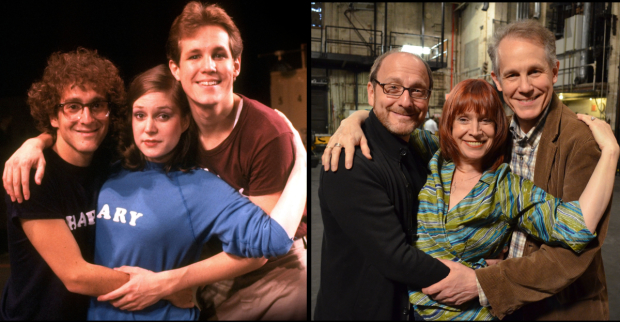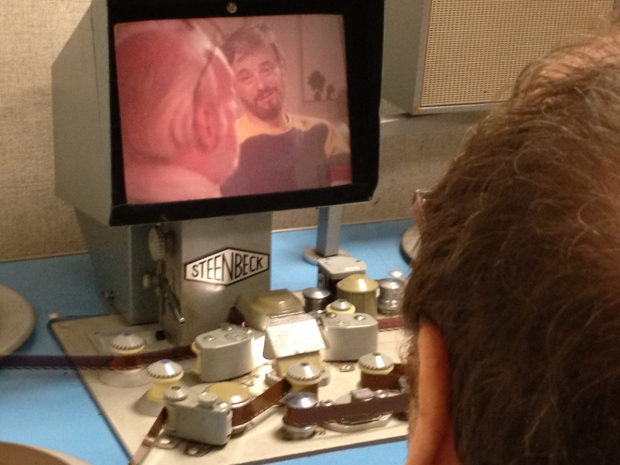Lonny Price on Merrily We Roll Along, the Best Worst Thing That Ever Happened
Price creates a new documentary about his experience in Stephen Sondheim and George Furth’s legendary Broadway musical.
"In 2002," Lonny Price begins, "I was the artistic director of Musical Theater Works, which was a theater dedicated solely to developing new musicals, and we needed a benefit. I thought, 'Well, everyone keeps doing these reunion concerts. What about Merrily We Roll Along with the original cast?'"
Price had a unique way of making that happen — he was, alongside Jim Walton and Ann Morrison, the star of that historic Stephen Sondheim, George Furth, and Harold Prince collaboration, a show that was supposed to set the world on fire and ended up closing after 16 performances in 1981.
"The board was unenthusiastic. But we sold out in, like, a minute."
Doing the concert, Price had a revelation. "It sounds kind of corny, but I realized as I was singing 'Old Friends' with Jimmy Walton that he was my old friend. It was no longer Charlie singing to Frank [referring to two of the show's characters], it was Lonny singing to Jim." That was the impetus for Price to start work on a documentary in the vein of Michael Apted's ongoing "Up Series," which has followed the lives of a group of British children, now adults, every seven years since 1964.
In keeping with Merrily's own story line, which travels backward in time to explore how a group of cynical adults became they way they are, I was so fascinated by the choices people make, and the price they pay for the choices they make, and for holding on to their dreams, and for letting them go," Price says. "It occurred to me, 'Wouldn't it be interesting to use the score of Merrily to reflect the journeys of the people who are actually in the show?'"
The result is Best Worst Thing That Ever Could Have Happened, a documentary that blends new interviews with original cast members including Jason Alexander, Abigail Pogrebin, and Terry Finn, with in-the-rehearsal-room tapes of Sondheim and Prince hard at work, shot for an ABC News special that never got made 35 years ago. With the film screening at New York's IFC Center now, and a Los Angeles release hitting screens November 25, Price spoke to TheaterMania to discuss the subject of "Growing Up."

(photo provided by DKC/O&M)
Tell me about all of the found-footage in the film. Why was it shot originally, and how did you find it after all these years?
ABC had an investment in [Merrily], and because this was going to be part of a news show called Close-Up, it was a conflict of interest, so they pulled it. Later on, they found out that [the Screen Actors Guild] said they would have had to have paid everybody SAG minimum. That's when they started saying, not only are we pulling it, but we destroyed the film. They didn't want anyone to know they filmed actors without paying. But I just didn't believe it.
We had this wonderful man named John Miller-Monzon, who Bruce Klein, our producer, hired to find it. He's a real pro at this. He said, "I think you have a nine percent chance at finding this." That's not what you want to hear. I just kept saying, "It's there." John constantly went back to ABC. It's all in a database, so he checked "Sondheim" and "Harold Prince" and "Alvin Theatre." Nothing. "Broadway." Nothing. Then he had a brainstorm and typed in "B'way," and thirty-seven boxes of film popped up.
What was your reaction when you got all the boxes?
It sounds really weird, but it almost feels like they had been waiting for me. When the boxes arrived for me to look at, they had been untouched for thirty-five years. It was a huge holy grail for me. We were going to cut the documentary without that footage. So you can imagine how it galvanized the project and elevated it.
There's a moment in the film where you watch the interview that ABC did with your twenty-year-old self. What was that like to experience firsthand?
It was completely surreal. It's meeting yourself as a young man. It's an extraordinary thing. I have to say, I've rarely had uncontrollable, heaving sobbing in my life, but I'm trying so hard not to cry. And then [being asked] the question "What do you think of him" and "would he like you" is heartbreaking. It's a part of the movie that I can't watch. I close my eyes or look away. It's just too revealing. It was [associate director] Matt [Coward]'s thought to film me watching it, and it was just so brilliant.

(photo provided by DKC/O&M)
What was one particularly resonant moment for you when working on Merrily We Roll Along?
Steve wrote "Franklin Shepard Inc." very, very late. I went through five weeks of rehearsals with "Lonny sings a song here" and then we moved on. The first third came in like three days before previews, the second third came in the day before previews, and I think the last third came in the day of the first preview. It was done with a piano, bass, and drums for a week because they didn't have time to orchestrate it, and I was so crazed trying to learn it. But we did it at the gypsy run and it stopped the show.
I never had material that good. People say, "You're so good in it," but it was written on me. I have three good notes, and Steve kept hitting them. He used my strengths. It's not surprising to me that people say it's a good fit, because you have the greatest tailor in the world making a suit for you.
How involved were Sondheim and Prince in the making of the film?
The first thing I had to do was get Steve to allow me to use the score. Without the score there would be no movie. He was gracious and knew that it wasn't a moneymaking proposition. Him and his lawyer, Rick Pappas, gave us a ridiculous sweetheart deal. He basically gave me the score, which was incredibly generous of him.
When I showed it to Hal, he was incredibly emotional about it. I'm hoping it's a little healing. He has always felt guilty about letting the kids down. Steve said the same thing. It's one thing to have a show that's not a success, and you're forty-five years old and you get another job. But it was so filled with our optimism and our hope, that clearly they felt very guilty about it.
The truth is, and I hope they get it now, it was such a gift to us, and we never blamed them. We thought it was amazing. We got to do it. It was devastating when it closed so quickly, but none of us ever thought anything but "thank you for this amazing gift." I hope that the film at least for them heals that part of the experience, which is clearly very complicated. But at least in terms of guilt about us, I hope they don't feel that as much anymore.










